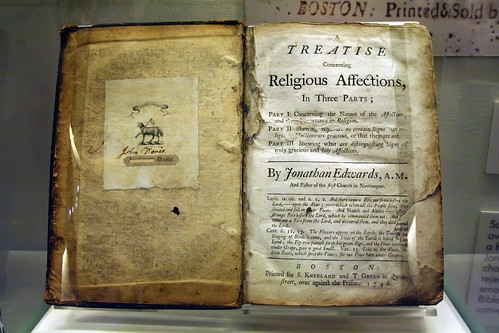Image by Tony Reinke - www.spurgeon.wordpress.com

In Part II of Religious Affections, Jonathan Edwards discusses different signs or evidences that neither prove nor disprove the existence of true religion in an individual. One of the the signs he discusses is confidence. Edwards suggests that confidence of one's religious estate and in one's religious experiences does not prove or disprove the vitality of one's religion.
In the ensuing discussion, Edwards discusses doubt which occurs in true saints, doubt which false saints do not experience. Here is the paragraph under consideration:
When once a hypocrite is thus established in a false hope, he has not those things to cause him to call his hope in question, that oftentimes are the occasion of the doubting of true saints; as, first, he has not that cautious spirit, that great sense of the vast importance of a sure foundation, and that dread of being deceived. The comforts of the true saints increase awakening and caution, and a lively sense how great a thing it is to appear before an infinitely holy, just and omniscient Judge. But false comforts put an end to these things and dreadfully stupify the mind. Secondly, The hypocrite has not the knowledge of his own blindness, and the deceitfulness of his own heart, and that mean opinion of his own understanding that the true saint has. Those that are deluded with false discoveries and affections, are evermore highly conceited of their light and understanding. Thirdly, The devil does not assault the hope of the hypocrite, as he does the hope of a true saint. The devil is a great enemy to a true Christian hope, not only because it tends greatly to the comfort of him that hath it, but also because it is a thing of a holy, heavenly nature, greatly tending to promote and cherish grace in the heart, and a great incentive to strictness and diligence in the Christian life. But he is no enemy to the hope of a hypocrite, which above all things establishes his interest in him that has it. A hypocrite may retain his hope without opposition, as long as he lives, the devil never disturbing it, nor attempting to disturb it. But there is perhaps no true Christian but what has his hope assaulted by him. Satan assaulted Christ himself upon this, whether he were the Son of God or no: and the servant is not above his Master, nor the disciple above his Lord; it is enough for the disciple, that is most privileged in this world, to be as his Master. Fourthly, He who has a false hope, has not that sight of his own corruptions, which the saint has. A true Christian has ten times so much to do with his heart and its corruptions, as a hypocrite: and the sins of his heart and practice, appear to him in their blackness; they look dreadful; and it often appears a very mysterious thing, that any grace can be consistent with such corruption, or should be in such a heart. But a false hope hides corruption, covers it all over, and the hypocrite looks clean and bright in his own eyes. (Religious Affections, 73, emphasis mine)
Thus we see that there are four ways that doubts arise in true saints:
- A cautious spirit that recognizes the importance of a sure foundation and dreads being deceived
- A knowledge of one's own blindness and the deceitfulness of one's own heart
- The assault of one's hope by Satan; Satan has no reason to assault the hope of the hypocrite
- A sight of one's corruption and blackness in the heart
I found it very interesting that Edwards could use doubt as a proof for true religion. In makes sense when the comparison is between the true saint and the over-confident hypocrite.
No comments:
Post a Comment